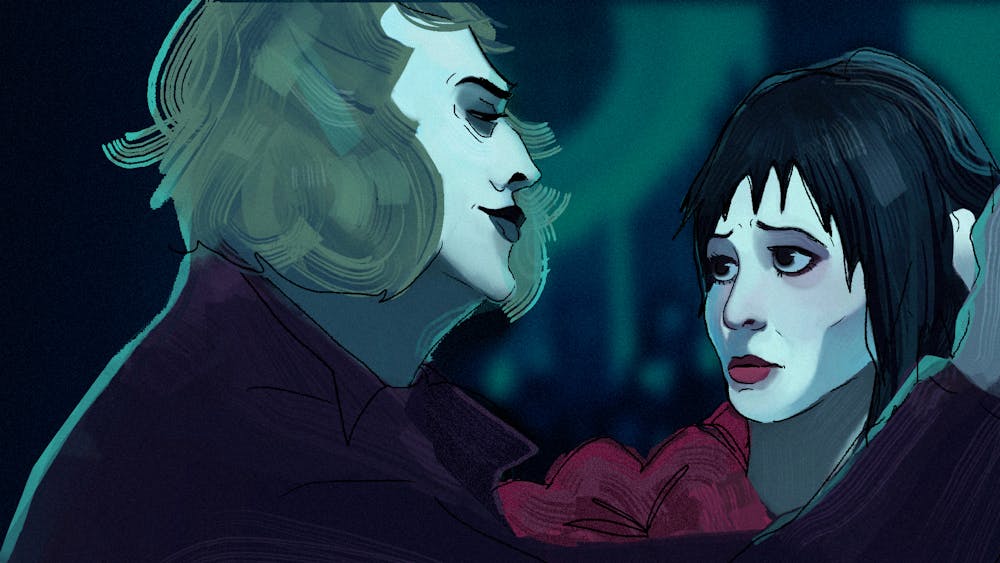I went into Beetlejuice Beetlejuice with my expectations firmly in check. While I love the original, Tim Burton hasn’t made a film I’ve liked since the Clinton administration. Couple this streak with the fact that Burton and co. have been trying to get a Beetlejuice sequel off the ground since the late ‘80s, and this all seemed like a recipe for disaster.
I am happy to report, therefore, that Beetlejuice Beetlejuice isn’t a disaster. It’s more fun and contains more flourishes reminiscent of his earlier career than any Burton film since 1999’s Sleepy Hollow. What’s frustrating, however, is that Beetlejuice Beetlejuice is an incredibly messy film—one that feels like it has a great movie inside it obscured by a series of odd script choices and general nonsense.
Before we get to the negatives, it’s important to celebrate what works about this sequel. The entire cast—Michael Keaton as Beetlejuice and Catherine O’Hara as Delia Deetz in particular—slip back into their roles seamlessly. Burton allows them to go wild at times, particularly Keaton, but the general charisma from everyone in the cast, from Keaton and Winona Ryder to new additions Jenna Ortega and Justin Theroux, makes this film eminently watchable. This also allows Burton to sprinkle in his usual entertaining weirdness. A scene early in the film explaining Jeffrey Jones’ absence from this sequel (for more on this, take a look at the horrific legal issues portion of Jeffrey Jones’ Wikipedia page) in which Burton shows the character's death as a stop motion animated sequence is more fun than anything he’s done in years. Ditto for the dance sequence, set to "MacArthur Park" by Richard Harris, that functions as the climax of the film. Burton has the juice back, and that in and of itself is reason to celebrate.
But this just makes the failings of this film all the more frustrating. The first, and the most underrated in my opinion, is the absence of Geena Davis and Alec Baldwin from the sequel. Baldwin’s absence obviously makes sense, but their absence is a microcosm of the larger structural issues this sequel faces.
Most people don’t remember that Davis’ and Baldwin’s characters, the Maitlands, are the necessary “straight men” of the first movie. Sure, the film is titled after Beetlejuice, and the Deetzs play a large role, but the Maitlands are the characters whose eyes we see this increasingly bizarre world through. With them gone, this film places the Deetzs—Ryder’s Lydia, O’Hara’s Delia, and Ortega’s Astrid—as our point of view characters, which throws the entire balance off. The Deetzs are funny in the first film because we’re seeing them through the eyes of two normies. With them at the center of frame, their antics are less effective. They need something to butt up against.
Additionally, this film’s script is a mess. The original Beetlejuice, for all its wackiness and strange flourishes, is ultimately a strikingly simple movie: A newly deceased couple, the Maitlands, navigate the afterlife as they try to scare away the new and deeply weird tenants of their house, the Deetzs. Everything else (the hijinks, the sandworms, even Beetlejuice himself) is window dressing on this core throughline. Where Beetlejuice Beetlejuice fails is that it doesn’t have any of this. There is no core, no easily explainable premise. My best attempt at it would be: three generations of Deetz women return to their family home for the funeral of their husband/father/grandfather and are subsequently messed with by Beetlejuice, his undead wife Delores (played by Monica Bellucci), and Wolf Jackson, an undead cop played by Willem Dafoe, who is also in this movie for some reason.
Whereas all the fun Beetlejuice hijinks, like the famous Day–O dance, are fun additions to the original, they somehow become the core plot of the sequel. And while some of these bits work in this movie, like the Mario Bava–esque sequence explaining Beetlejuice and Delores' relationship, the core structure is off. Bellucci and Dafoe both serve the same narrative function, and are quickly dispatched with when the movie gets bored of them. There are no core emotional stakes for any of these characters. Neither Ryder nor Ortega get much to play, and what they do get feels stilted and off.
Ultimately, this sequel falters because it's trying too hard. It’s not as annoyingly self–serious as some legacy sequels have been (cough cough, Ghostbusters: Afterlife, cough cough), but it still feels like the filmmakers had a list of Beetlejuice bits they had to repeat to make a sequel work. We don’t need any of that. This is Beetlejuice. We’re here for wacky fun and Michael Keaton going ham. The closeness to a good movie makes this movie’s failings all the more palpable. Michael Keaton does get to have some fun. Burton does get to play with the form in a way that feels fresh. It’s just all obscured by bad writing and nostalgia bait.
At the end of the day, I did have a blast. What can I say, I’m an easy mark for Beetlejuice. But it’s hard not to feel like this fun–but–not–good movie could have been truly fun–and–great if everyone agreed to do less.

